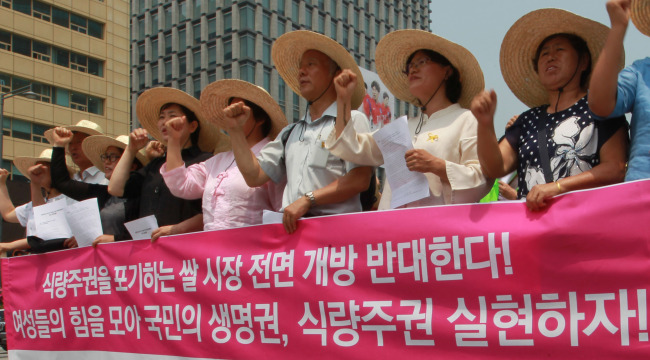The Seoul government is set to announce its final plans for opening the rice market as early next week despite strong objections from farmers as well as ongoing debates about high import duties, a pre-condition for the market opening.
“We could no longer delay our decision. We have no other alternative, but to accept the market opening by imposing tariffs (on rice imports),” Yeo In-hong, vice minister of agriculture, food, and rural affairs said during the last public hearing, held at the National Assembly on Friday.
His comments came as the Seoul government is set to make a decision on opening its rice market with the deadline set by the World Trade Organization approaching in September.
 |
| Farmers take to the streets in Gwanghwamun, Seoul, on June 17, to protest against Korea’s rice market opening to foreign producers. (Yonhap) |
The vice minister said the ministry concluded that it would be a better choice to open the market by slapping high tariffs on rice imports instead of putting off liberalization to protect the local farm industry.
The ministry will reportedly announce tentative tariff rates for rice imports as early as next week, with experts predicting that the import duties will range from 400 to 500 percent. The vice minister said the duty rate had not yet been fixed.
Local farmers are still divided over the market liberalization. The Korean Advanced Farmers Federation, a lobby group of local farmers, said they can accept the opening of the market if the government keeps tariffs for imported rice as high as possible.
The progressive Korean Peasants League, however, is strongly protesting the market opening, citing worries about free trade agreements’ potential threats to the local agricultural industry.
“The government is saying there is no other option without even trying to begin negotiations (with WTO),” Park Hyung-dae, an official from the Korean Peasants League said Friday.
The progressive farmers’ group insists that the government should request a waiver from the WTO to keep its restrictions on imported rice, though it still requires approval from the members of trade organization.
The government said earlier it would make its stance before the end of June but delayed its decision, citing more time needed to consult with the National Assembly before it notifies the WTO in September.
South Korea must make a decision on the rice market as the current waiver deal with the WTO ends this year. The country was allowed to delay its rice market liberalization for 10 years under a 1993 agreement with the WTO in which the country agreed to increase its minimum market access import quota by 20,000 tons per year. The government extended the agreement by 10 years in 2004.
By Oh Kyu-wook (596story@heraldcorp.com)



